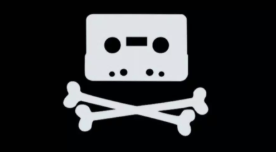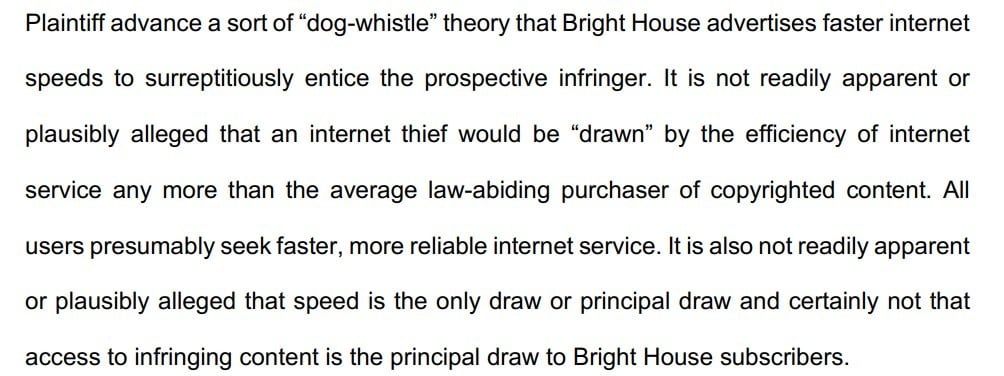
A federal court in Florida has dismissed the vicarious copyright infringement claims against ISP Bright House Networks. The company is being sued by a group of prominent record labels who argue that the Internet provider directly profited from piracy. The court disagrees, characterizing the accusations as "a sort of 'dog-whistle' theory."

Last year a group of music industry giants, including Sony, Universal, and Warner Bros, sued Bright House Networks for failing to disconnect pirating subscribers.
Bright House is owned by Charter, which was sued in a separate complaint simultaneously. In both cases, the music companies demanded compensation for their alleged losses.
The lawsuits, which are part of a broader legal campaign against ISPs, have continued on their own paths since. Both Bright House and Charter submitted motions to dismiss the claims. For Bright House, this resulted in a victory late last week.
In February, the ISP submitted a motion to dismiss the vicarious copyright infringement claims. Bright House refuted the claim that it profited directly from pirating subscribers, something which the court now agrees.
Florida Court Dismisses Vicarious Infringement Claim
US District Court Judge Mary Scriven dismisses the music companies’ allegations, describing their argumentation as insufficient.
The music companies argued that some subscribers are “drawn” by the ability to pirate and Bright House’s “failure to police” piracy, which resulted in copyright infringement on a “massive” scale.
However, according to the court, this is not enough to show that there’s a direct financial benefit. Judge Scriven notes that the ability to download infringing content is just one of many reasons people may have to subscribe to Bright House’s services.
“At most, Plaintiffs allege that access to infringing content generally available on the internet is one of many reasons motivating some subscribers to enroll with any ISP,” Scriven writes.
“Plaintiff do not allege that there is anything unique about the service Bright House offers as a portal to the internet or as a portal to this alleged contraband content,” she adds.
Even if the ability to pirate is a draw, the music companies still fail to show that this is the primary draw, which is required to prove vicarious copyright infringement.
Dog-Whistle Theory
According to Judge Scriven, the copyright holders rely on some sort of “dog-whistle” theory which claims that prospective pirates are lured in by Bright House’s ads for high-speed downloads.
“It is not readily apparent or plausibly alleged that an internet thief would be ‘drawn’ by the efficiency of internet service any more than the average law-abiding purchaser of copyrighted content. All users presumably seek faster, more reliable internet service,” Judge Scriven writes.

If that theory held up, it would essentially apply to all Internet providers, she clarifies, while stressing that high speeds and access to BitTorrent downloads are not exclusive to Bright House’s services.
Based on these and other arguments, the Florida district court dismissed the vicarious copyright infringement claim.
“The Court concludes that Plaintiffs have failed to adequately allege that Bright House receives a direct financial benefit from its users’ infringing activity. For this reason, the vicarious liability claim fails,” US District Court Judge Mary Scriven writes.
This doesn’t mean that the lawsuit is over. Bright House didn’t request dismissal of the contributory copyright infringement allegation, so for now, the case will go ahead based on that claim.
A copy of US District Court Judge Mary Scriven’s order on the motion to dismiss the vicarious liability claim is available here (pdf)
